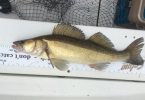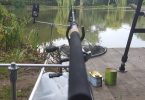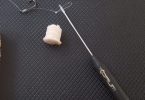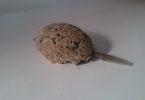Let me put my pedigree on the line; I’ve been at it a long time! Seriously, lure fishing has been my passion since the mid 1950’s. In that time I have fine-tuned a successful technique for the Broads, where I live. Success is something that I keep reasonably quiet about. Not because I don’t catch but to do otherwise invites an influx of fish killing part-timers. Not only that, fishing solo, in a small boat, as I do means the required photograph is just not possible. I am not going to tow a pike to the bank, sacked until I can go through the routine of the regulation photo-call. I would rather hand and unhook the pike in the water. So, if you need photographic proof of my ability then sorry, can’t help! All I can say is, read on and judge for yourself. In the meantime, sat on my Black Shakespeare Tackle Box, here is Summer Piking, my Way!
Summer piking is simple. The pike hang round the margins. Watch for the signs, a heron standing in the margin is the number one giveaway. Where he is where the pike are. Mother ducks take their young into the margins to feed. They might feed for half an hour or more, without alarm. But suddenly all hell lets loose as the ducks flee as a pike goes on the feed. Almost all my summer caught twenties have been located because of ducks taking fright. My theory being that it is only bigger pike that eat ducks. Take a note of where other anglers are catching bream. Bream have fixed patrol routes. If these go near that heron you know you will be onto a bigger fish. Cormorants are another giveaway, they feed on what pike feed on, simple. Watch, as the tide drops. There is a magic moment when the receding tide triggers a pike into moving. The reeds part as they leave their lair. Magic, it’s time to catch! A roach, skimming across the surface, like a stone thrown by a kid who is playing ‘ducks & drakes’, determined to escape the hunting pike; an eel twinning itself around a reed stem, lifting itself clear of the water, signs to be savoured. Another, literally stirring giveaway, is rowing along a shallow margin, watching for tail swirls in the mud. Without warning, all around you, sometimes more than can be counted, swirls of mud. And who says pike don’t form shoals!
Some things are better left in to soak, but, during the summer, not a dead bait! I say that with great sincerity as, during that time of the year, pike are inclined to gorge dead bait. Not so with a lure, lip or scissor hooking being more usual. That aside, in my book, summer lure fishing is, without question, a most enjoyable means by which pike can be caught. Successful too. How many soakers of mackerel section can claim to have caught forty and fifty pike in a day? I know that the ‘pike fishing guide’, Charlie Bettell has, as has yours truly.
So, having found your fish, how to catch them. After owning scores of rods and reels I feel that I now have the ultimate outfit for the Broads. Brundall Angling market the Retrieve Technique range of rods. Their number five model, rigged for a multiplier, is a gem. A steely action for setting the hook, a lively tip to flick out even a small bait, backbone for handling bigger lures, the ability to cope with a small perch or the biggest pike around, as I say, a gem. Linked to a Shimano Curado and the combination is complete. I am blessed with living besides the Broads. I am able to fish thirty or forty hours per week during the summer. This is terribly demanding on tackle. The only line that I have found to survive this kind of hammering is Fireline. The surface quickly fluffs up but the strength remains. Some lines, such as those with an outer case and an inner core, can be dangerous for pike. If the ‘outer’ becomes nicked on an obstruction, their integrity is destroyed, their strength suddenly reduced to practically nil.
So what goes on the end? Apart from a good trace, and the Fox ones take some beating, I would suggest being totally unfashionable and clip on a biggish spoon. Above the trace, about eighteen inches from the lure, pop a Roberts tackle lift. It’s a simple device that sea fishermen use to lift their tackle clear of obstructions on retrieve. It planes to the surface, lifting quite heavy tackle. It’s a handy tip for dead-baiters fishing over obstructions. Linked to a big spoon it produces an incredibly versatile and effective lure. Rip it across the surface, let it sink back and drawer it back to the top. Sink and draw style, sub surface, dropped to the bottom and jerked back to life. It catches and goes on catching. The summer fishing grounds of the Broads seldom exceed one meter in depth. This one technique allows you to explore every inch of that water with great success. Cast hard against the reeds, drop into every nook and cranny, expect, and get, adrenaline rushing takes. It’s not for the dickhead or weak hearted. Sound tackle and sound technique is the order of the day. Unfortunately it can be too easy and those who are likely to cause a fish to die can and do catch fish. It’s a time when pike should be released quickly, unhooked whilst in the water, spared the obligatory photo-shoot. Hot days and hard fights are not good news for pike that are kept out of the water one second longer than necessary. Gassing up does not happen to pike quickly returned to their environment.
Okay, so you believe in plugs. Give them a try but, in my experience, a well fished spoon, about four or five inches long, will out-fish any plug on summertime Broadland pike. Its exciting fishing when a pike, even a twenty pounder, hits the spoon with such force that the fish totally clears the surface, then lands with a forceful thrash of its tail, splashing the angler and surging off on a thirty yard dash for freedom. That’s summer fishing, when pike are real scrappers, unlike the winter fish that is tame in comparison.
There is just one other thing. To fish the Broads with consistent success means using a rowing boat. A rowing boat rowed quietly! Not some big, brash, outboard powered fish frightener. If you follow my fish finding advice, approach the fish holding areas with stealth and finesse, then success is likely to be yours!
Take care, tight lines and may your fish be long ones.
Peter Waller







